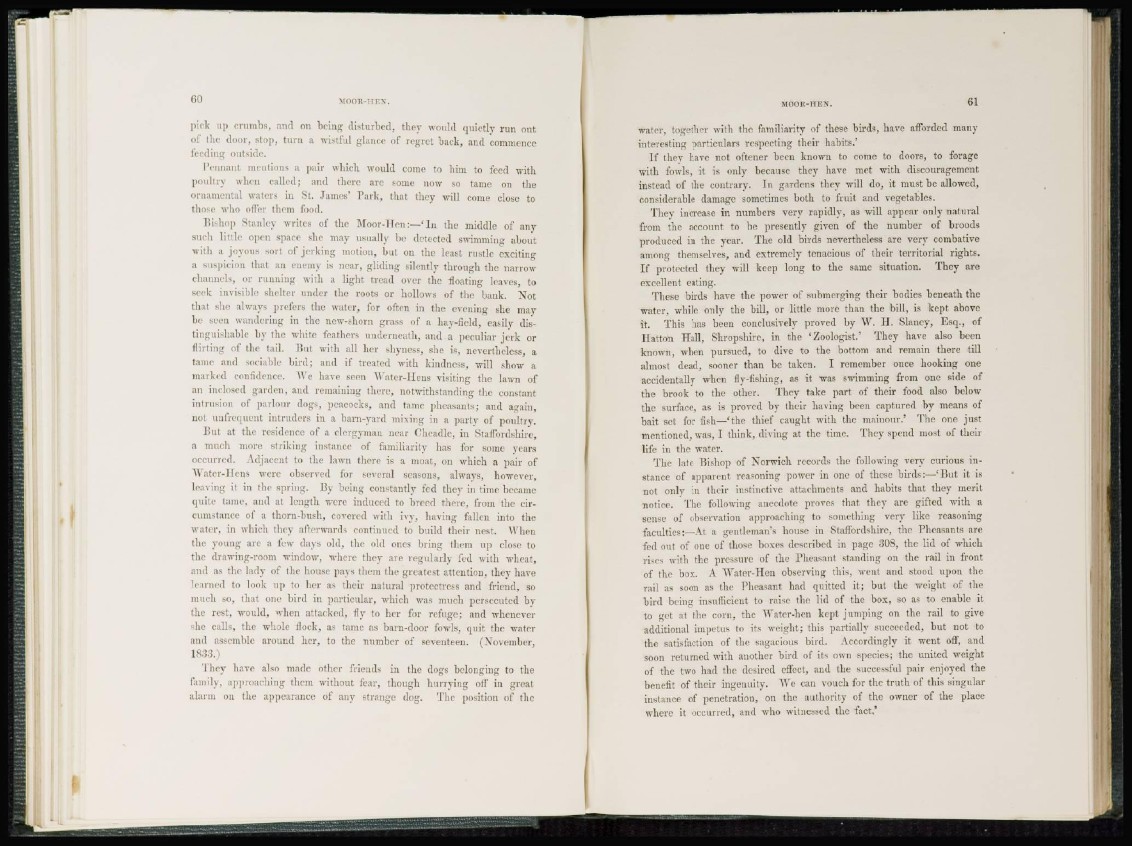
60 MOOR-TIEN".
pick up crumbs, and on being disturbed, they would quietly run out
of the door, stop, turn a wistful glance of regret back, and commence
feeding outside.
Pennant mentions a pair which would come to him to feed with
poultry when called; and there are some now so tame on the
ornamental waters in St. James' Park, that they will come close to
tlie^c who offer them food.
Bishop Stanley writes of the Moor-1 [ e n : — ' I n the middle of any
such little open space she may usually be detected swimming about
with a j o y o u s sort of jerking motion, but on the least rustle exciting
a suspicion that an enemy is near, gliding silently through the narrow
channels, or running with a light tread over the floating leaves, to
seek invisible shelter under the roots or hollows of the batik. Not
that she always prefers the water, for often in the evening she may
be seen wandering in the new-shorn grass of a hay-field, easily distinguishable
by the white feathers underneath, and a peculiar j e r k or
flirting of the tail, lint with all her shyness, she is, nevertheless, a
tame and sociable bird; and if treated with kindness, will show a
marked confidence. AVc have seen Water-llcns visiting the lawn of
an inclosed garden, and remaining there, notwithstanding the constant
intrusion of parlour dogs, peacocks, and tame pheasants; and again,
not unfrequent intruders in a barn-yard mixing in a party of poultry.
Bui at the residence of a clergyman near ('beadle, in Staffordshire,
a much more- striking instance of familiarity has for some years
occurred. Adjacent to the lawn there is a moat, on which a pair of
Water-! I mis were observed for several seasons, always, however,
leaving h in the spring. By being constantly led thev in time became
quite tame, and at length were induced to breed there, from the circumstance
of a thorn-bush, covered with ivy. having fallen into the
water, in which they afterwards continued to build their nest. \\ hen
the young arc a few days old, the old ones bring them up close to
the drawing-room window, where they are regularly fed with wheat,
and as the lady of the house pays them flic greatest attention, they have
learned to look up to her as their natural protectress and friend, so
much so, that one bird in particular, which was much persecuted by
the rest, would, when attacked, fly to her for refuge; and whenever
she calls, the whole flock, as tame as barn-door fowls, quit the water
aud assemble around her, to the number of seventeen. (November,
1833.)
'1 bey have also made other friends in the dogs belonging to the
family, approaching them without fear, though hurrying off in great
alarm on the appearance of any strange dog. The position of the
M O O l l - H E X . 6 1
water, together with the familiarity of these bird*, have afforded many
interesting particulars respecting their habits.'
If they have not oftener been known to come to doors, to forage
with fowls, it is only because they have met with discouragement
instead of the contrary. In gardens they will do, it must be allowed,
considerable damage sometimes both to fruit and vegetables.
They increase in numbers "very rapidly, as will appear only natural
from the account to be presently given of the number of broods
produced in the year. The old birds nevertheless are very combative
among themselves, and extremely tenacious of their territorial rights.
If protected they will keep long to the same situation. They are
excellent eating.
These birds have the power of submerging their bodies beneath the
water, while only the bill, or little more than the bill, is kept above
it. This has been conclusively proved by W. H. Slaney, Esq., of
Tlatton Hall, Shropshire, in the * Zoologist.' They have also been
known, when pursued, to dive to the bottom and remain there till
almost dead, sooner than be taken. I remember once hooking one
accidentally when fly-fishing, as it was swimming from one side of
the brook to the other. They take part of their food also below
the surface, as is proved by their having been captured by means of
bait set for fish—'the thief caught with the mainour.' The one just
mentioned, was, I think, diving at the time. They spend most of their
life in the water.
The late Bishop of Norwich records the following very curious instance
of apparent reasoning power in one of these birds:—'But it is
not only in their instinctive attachments and habits that they merit
notice. The following anecdote proves that they arc gifted with a
sense of observation approaching to something very like reasoning
faculties:—At a gentleman's house in Staffordshire, the Pheasants are
fed out of one of those boxes described in page 308, the lid of which
rises with the pressure of the Pheasant standing on the rail in front
of the box. A Water-Hen observing this, went and stood upon the
rail as soon as the Pheasant had quitted it; but the weight of the
bird being insufficient to raise the lid of the box, so as to enable it
to get at the corn, the Water-hen kept jumping on the rail to give
additional impetus to its weight; this partially succeeded, but not to
the satisfaction of the sagacious bird. Accordingly it went off, and
soon returned with another bird of its own species; the united weight
of the two had the desired effect, and the successful pair enjoyed the
benefit of their ingenuity. We can vouch for the t r u t h of this singular
instance of penetration, on the authority of the owner of the place
where it occurred, and who witnessed the fact.*